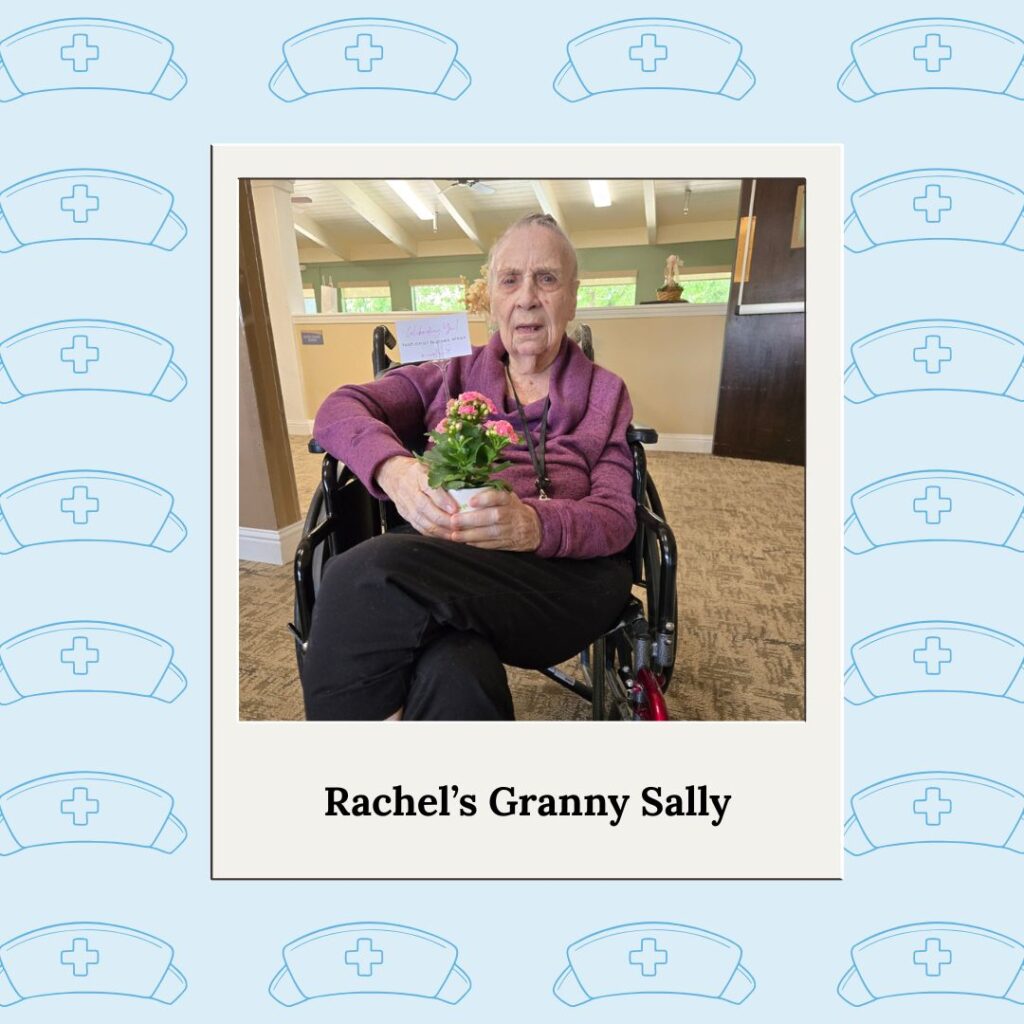By Rachel Reed
I come from a family of nurses, so when Nursing Appreciation Week comes around every year, my heart is already full of thankfulness and gratitude for nurses. I can look back on my earliest memories of my grandmother, Sally Ryland, in her white nurse uniform, digging through her bag for Campho Phenique, which she put on any of my scratches and sores–it was her go-to, her cure-all, along with Vick’s VapoRub.
Sally, my Granny, began her nursing education at age 26 and graduated from UCLA with an A.S. In Nursing at age 28. After that, she worked at a convalescent center for a year, from 1965-1966. Granny was then hired by Cedars-Sinai Hospital in Los Angeles as a floor nurse, where she worked from 1967-1969. She moved to Fresno in 1969 and worked as a floor nurse, charge nurse, and House Supervisor at Sierra Community Hospital. After that, she worked at the new Kaiser Permanente built in Fresno. She ran the ICU and also worked as the House Supervisor. Following that position, she went to work at Fresno Community Hospital in the Renaissance Adolescent Center from 1986 until she retired in 1996. Granny worked as an RN for 30 years, from 1966-1996. During that time, she also obtained her B.S. and Master’s Degree at Fresno State and was a licensed LFMT and Certified Drug & Alcohol Counselor. Granny worked many weekends and evening shifts, from 3-11 pm, for years while working on her other degrees, licensing, and certifications.

Not only do I have her legacy of nursing, but I have that of her sisters, as well. Aunt Becky and Aunt Alta were both RN’s. Aunt Janice and Aunt Bernetta were both CNA’s. Aunt Cathy was an LVN. Gran’s daughter, my Aunt Laura, is a retired RN. My own sister, Rebecca, is a nationally certified oncology nurse.
My family of nurses has taught me so many things. First of all, a good nurse is a caring nurse. Nurses are hardworking, intelligent, fast-thinking, and honorable. A good nurse is worth more than any hospital can pay her. She is, in fact, worth more than diamonds or rubies, any precious metals, luxury hotels, or vehicles. A good nurse deserves more than we can offer her, so treat her well. Respect her. Listen to her. Give her your time and attention–she knows what she is talking about, and she has something to say. A good nurse is where I come from. If I didn’t pass out at the sight of blood, I would probably be one.
To all of the nurses out there–I see you and I honor you this week.
To my family of nurses–I thank God for your loving care every single day, and for the legacy of love I have because of you. Thank you.
When exploring senior care options, time is a critical factor to consider. Understanding the differences between residential care facilities and assisted living facilities is key to making the best decision for your loved one.
Residential care facilities, often referred to as board and care or 6-bed care homes, typically have a license to accommodate only up to six residents at a time. This smaller setting can offer a more intimate and personalized level of care but may limit your options based on location, care requirements, and budget. On the other hand, larger assisted living facilities have a higher likelihood of having availability to meet your needs at any given time, offering more flexibility in senior care options.
When it comes to Alzheimer’s, the timing of transitioning your loved one into a care facility can be particularly challenging. The decision often revolves around safety—both for the person with Alzheimer’s and their caregiver. Critical questions include: Can the caregiver continue providing safe home care? Is the home environment safe for someone with Alzheimer’s or dementia? Does your loved one require a secured and controlled environment, or specialized memory care and activities?
It's also essential to consider your loved one's ability to adapt to a new living environment. Waiting too long might make the transition more challenging. Regardless of when you decide to make the move, it’s crucial to approach the process with patience and seek support from others.
Assisted living facilities offer a wide range of care levels, from residents who are mostly independent to those requiring significant assistance. One advantage of moving to an assisted living facility while your loved one is still relatively independent is the potential for lower initial costs. Additionally, the staff can get to know the resident in every stage of life, which helps build strong relationships and ensures continuity of care. However, it’s important to note that senior care options in assisted living facilities might be more limited if your loved one needs a high level of care at the time of admission.
Residential care homes, or 6-bed care homes, provide a more intimate setting, which can be ideal for individuals who require a higher level of care. These homes offer a variety of living arrangements, including private rooms with private bathrooms, private rooms, or shared rooms. This type of environment might be better suited for someone who is advanced in the aging process and requires more individualized attention.
The best time to explore senior care options and transition your loved one into an assisted care facility is before a major health crisis occurs. If your loved one requires increased oversight, is having more accidents, or experiencing frequent falls, it may be time to consider moving to a care facility before a significant health issue arises. As mentioned earlier, if it’s no longer safe for your loved one to stay at home, it’s time to look into appropriate senior care options. Learn more about senior living options here.
Don't wait until a crisis arises. Contact us today for a free consultation and personalized guidance on the right time and care setting for your family’s needs. Let us help you make the best decision for your loved one's future. Give us a call at (559) 283-2576 today.
Learn more about David and Rachel Reed, co-owners of Assured Senior Living Solutions as highlighted in The Business Journal:

As you already know, the challenges that accompany the caregiving role are plenty, not the least of which is maintaining adequate hygiene. Getting ready for the day can be exhausting. While there are some proven methods that help, there is no one-size-fits-all formula. Consider these suggestions as you see to it that your loved one is properly cared for.
1. Be patient with yourself
It is not uncommon to experience complaints, resistance, or even combatant behavior. These are indicative of the disease and not a result of something you are doing wrong. Resist the urge to look for a cause or cast blame upon yourself. Don’t take their frustrations personally.
2. Develop and stick to a routine
Disrupting your loved one’s routine induces anxiety, confusion and frustration. If they feel disoriented, they will be more apt to be resistant or even combative. Come up with a simple morning and evening routine that works well and stick to it as much as possible. Be concise and only include what is necessary. You don’t want to wear your loved one out before they are ready for the day.
3. Encourage independence
Honoring your loved one’s independence, may require more time and direction. Be patient and avoid rushing them. Offer succinct directions so as not to overwhelm them. Give them a task that they are capable of, such as brushing their hair, while you tend to something more difficult like cleaning their dentures. It will boosts their self-esteem, and distract them from the fact that they actually are dependent.
4. Limit correcting
It may be instinctive for you to correct your loved one, especially if you have raised children. But the care we provide for our elderly is contrary to that which we give our children. It is imperative that we, as caregivers, are willing to adapt. Our loved ones aren’t learning to do daily activities, they are forgetting how to do them. The objective here, isn’t to teach them. It is to support them.So when they don’t do something “right” or the way they once did, like parting their hair on the right side instead of the left, resist the temptation to fix it. If it’s not going to put them in harm’s way, let it be. But if it poses a danger, be subtle as you redirect.
5. Prepare for bath time
Bathing can be one of the most difficult challenges. While it is important to communicate to your loved one that you will be giving them a bath, delay doing so. Explaining too soon (before breakfast, for instance) may prompt premature anxiety and they may get fixated on the bath, which will interfere with other activities. It can also make the trip to the bathroom more difficult.
Have everything prepared and ready so they can return to their normal routine as quick as possible. However, be aware that quick and rushed movements may feel aggressive and perhaps even scary. Acknowledge their fears and don’t chastise them for their resistance. Reassure them as you tend to the task.
6. Less is more when it comes to wardrobe
Simplify the dressing process for your loved one by limiting their options of what is available. Remove confusing and restricting articles like pullovers and lace-ups and replace them with zip-ups and slip-ons.If your loved one has an attachment to a certain piece of clothing, it may help to add articles that give them the same tactile and sensory experience.
At the end of the day, remember that your goal is to make sure your loved one is well taken care of. Consider that you may have to set aside some of your own standards. Try to keep your focus on the simple and crucial elements of care.
Contributed by Leah Bingham